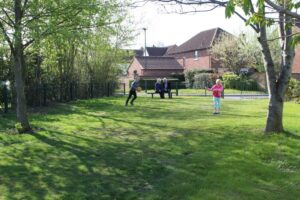Support us from £3/month
We deal with almost 1000 cases a year assisting communities, groups and individuals in protecting their local spaces and paths in all parts of England and Wales. Can you help us by joining as a member?
We have published a new edition of Getting Greens Registered, our step-by-step guide to registering land in England and Wales as a town or village green. Once registered, the land is protected from development and encroachment, and local people have rights of recreation there.
The new (fourth) edition explains how local people must gather evidence of 20 years’ use of an area of land, showing that they have enjoyed the land for recreation without challenge or permission. It sets out the various tests which must be met. All the evidence is then sent to the registration authority (county or unitary council) which will determine whether the land qualifies as a green.
The book also spells out the pitfalls to registration, for instance if the land is subject to planning permission it is already too late to apply to register it.
The society is running its Grant a Green campaign to encourage landowners voluntarily to register land as a green, in order to protect it and give people rights there. It suggests that local authorities are particularly well placed to do this in the public interest, and that developers should also do this to provide a benefit to the community.

Local people enjoy the new green at Scorton in North Yorkshire which was voluntarily registered by the parish council. Photo: Scorton Parish Council.
Says Nicola Hodgson, one of our case officers: ‘Town and village greens are much more than the archetypal green space in the heart of a village. Any land, however scruffy and neglected, can be a green provided local people have enjoyed unchallenged recreation there. But once land is threatened with development it may be too late to register it.
‘We urge local communities to think now about the land in their locality which they use informally and which might be eligible for registration. If there is such land, they should put in an application to register it as a green before it is too late.
‘We also urge local councils and other local authorities voluntarily to register their land as greens, to protect it for local people.
‘Fine examples have been set by Dartmouth Town Council in Devon, which registered the community orchard in 2021; and in 2020 by Henley-on-Thames Town Council in Oxfordshire (Freeman’s Meadow), Scorton Parish Council in North Yorkshire (land at Blenheim Close), and East Malling Larkfield Parish Council in Kent (Whimbrel village green),’ says Nicola.
The book can be downloaded here for £12. The original text was by the late John Riddall, and has been edited by Nicola Hodgson.
